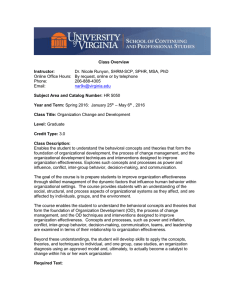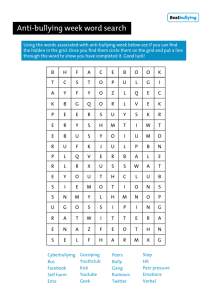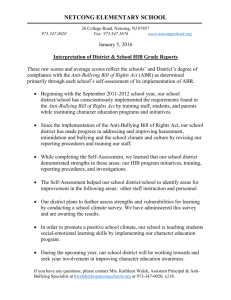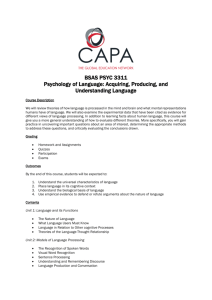Educational Psychology for Elementary Majors
advertisement
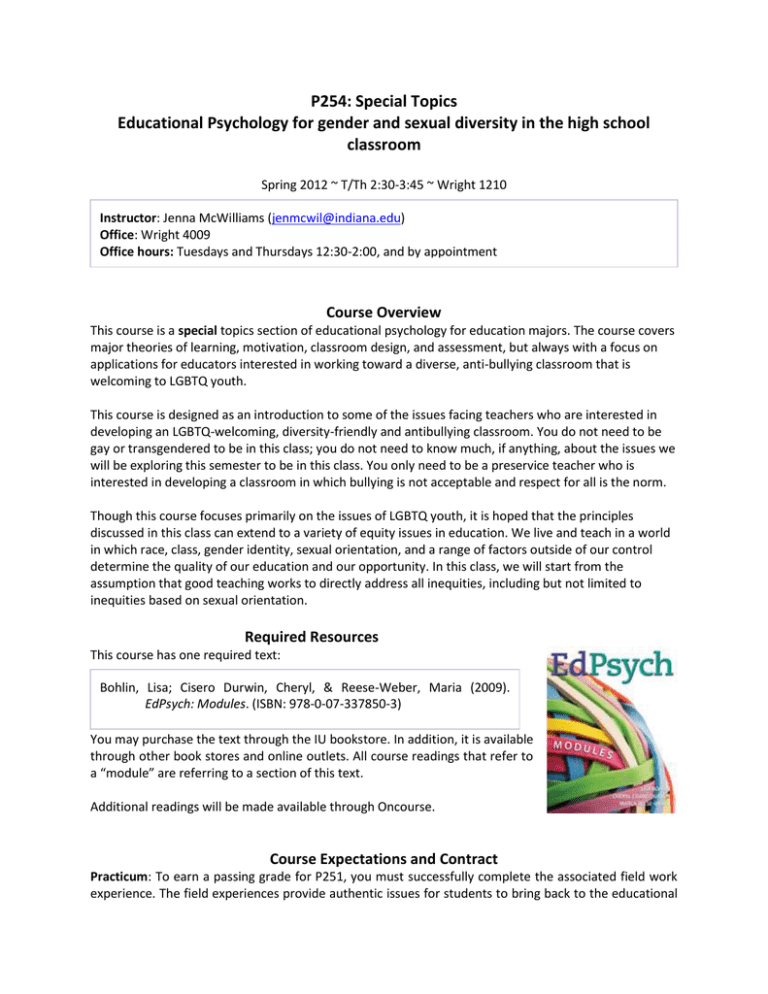
P254: Special Topics Educational Psychology for gender and sexual diversity in the high school classroom Spring 2012 ~ T/Th 2:30-3:45 ~ Wright 1210 Instructor: Jenna McWilliams (jenmcwil@indiana.edu) Office: Wright 4009 Office hours: Tuesdays and Thursdays 12:30-2:00, and by appointment Course Overview This course is a special topics section of educational psychology for education majors. The course covers major theories of learning, motivation, classroom design, and assessment, but always with a focus on applications for educators interested in working toward a diverse, anti-bullying classroom that is welcoming to LGBTQ youth. This course is designed as an introduction to some of the issues facing teachers who are interested in developing an LGBTQ-welcoming, diversity-friendly and antibullying classroom. You do not need to be gay or transgendered to be in this class; you do not need to know much, if anything, about the issues we will be exploring this semester to be in this class. You only need to be a preservice teacher who is interested in developing a classroom in which bullying is not acceptable and respect for all is the norm. Though this course focuses primarily on the issues of LGBTQ youth, it is hoped that the principles discussed in this class can extend to a variety of equity issues in education. We live and teach in a world in which race, class, gender identity, sexual orientation, and a range of factors outside of our control determine the quality of our education and our opportunity. In this class, we will start from the assumption that good teaching works to directly address all inequities, including but not limited to inequities based on sexual orientation. Required Resources This course has one required text: Bohlin, Lisa; Cisero Durwin, Cheryl, & Reese-Weber, Maria (2009). EdPsych: Modules. (ISBN: 978-0-07-337850-3) You may purchase the text through the IU bookstore. In addition, it is available through other book stores and online outlets. All course readings that refer to a “module” are referring to a section of this text. Additional readings will be made available through Oncourse. Course Expectations and Contract Practicum: To earn a passing grade for P251, you must successfully complete the associated field work experience. The field experiences provide authentic issues for students to bring back to the educational EDUC-P251 mcwilliams psychology class and are not designed for direct supervision by an IU instructor. Note that you will receive a pass or a fail grade for M101 and those who do not complete their field work requirement will get a failing grade for P251 regardless of their actual progress in the course throughout the semester. Attendance is documented with a time sheet that is mailed to each cooperating teacher to document the hours the student attended. All questions or issues related to M101 should be directed to Tiffany Dolder-Holland. Her contact information is: Tiffany Dolder-Holland Office of Early Field Experiences Suite 1000 Office of Teacher Education School of Education Office hours 8-5 Wed/Thurs. Phone: 856-8502 for message tdolder@indiana.edu Participation: Your attendance, timely completion of all assignments, and participation in class discussions and activities are essential parts of your contribution to class. You are expected to complete the reading and assignments prior to each class. I assume that you will do so and I will refer to the readings as if you have. Be prepared for a reading quiz at the beginning of any class. Your engagement and participation in class activities are important not only for your own learning but also for the learning of others. Your participation in small group and whole class discussions will constitute a significant part of your grade. Paperless classroom policy: We live in a world of dwindling resources. This class will be partially paperless: I will limit the printed materials I provide you for this course. All relevant course materials will be made available in electronic format through OnCourse or eReserve. Please note that it is your responsibility to bring copies of the assigned readings and some supplemental materials to class. If you choose not to print course readings and materials, you may bring electronic copies on a laptop or eReader (Kindle, Nook, iPad, etc.). Electronic technologies: As noted above, you may choose to bring a laptop, eReader, or similar learning tool to class. During class time, these tools should be used for class purposes only; use of these technologies for non-class purposes may result in a loss of participation points. Please silence your cellphone, turn off your mp3 player, and log out of Facebook and other non-school social networks and communication tools before class begins. Participation: Your attendance, timely completion of all assignments, and participation in class discussions and activities are essential parts of your contribution to class. You are expected to complete the reading and assignments prior to each class. I assume that you will do so and I will refer to the readings as if you have. Be prepared for a reading quiz at the beginning of any class. Your engagement and participation in class activities are important not only for your own learning but also for the learning of others. Your participation in small group and whole class discussions will constitute a significant part of your grade. EDUC-P251 mcwilliams Attendance: Missed classes will affect your grade. Students who must miss class need to inform me in advance, if possible. Absences will be excused due to emergencies that are beyond the student’s control, such as personal illness, or critical illness or death in the family, and need to be documented with a note. Students who miss class are responsible for assignments listed on the syllabus and any assignments announced in class. If you have more than two unexcused absences, your participation grade will be affected—for every subsequent absence, your participation grade will be reduced by one grade level. For example, if you were getting an “A” for participation, it will be reduced to a “B” for your third unexcused absence, etc. Academic Integrity: Typically, when instructors talk about “academic integrity,” they focus primarily on plagiarism. In fact, the Indiana University Code of Student Conduct lists plagiarism as one of at least 6 distinct forms of academic misconduct. All 6 are listed below; misconduct in any of these areas is grounds for discipline and may result in failure of the course. Significant violations of the Code can result in expulsion from the University. 1. Cheating Cheating is considered to be an attempt to use or provide unauthorized assistance, materials, information, or study aids in any form and in any academic exercise or environment. 2. Fabrication A student must not falsify or invent any information or data in an academic exercise including, but not limited to, records or reports, laboratory results, and citation to the sources of information. 3. Plagiarism Plagiarism is defined as presenting someone else’s work, including the work of other students, as one’s own. Any ideas or materials taken from another source for either written or oral use must be fully acknowledged, unless the information is common knowledge. What is considered “common knowledge” may differ from course to course. a. A student must not adopt or reproduce ideas, opinions, theories, formulas, graphics, or pictures of another person without acknowledgment. b. A student must give credit to the originality of others and acknowledge indebtedness whenever: 1. directly quoting another person’s actual words, whether oral or written; 2. using another person’s ideas, opinions, or theories; 3. paraphrasing the words, ideas, opinions, or theories of others, whether oral or written; 4. borrowing facts, statistics, or illustrative material; or 5. offering materials assembled or collected by others in the form of projects or collections without acknowledgment 4. Interference A student must not steal, change, destroy, or impede another student’s work, nor should the student unjustly attempt, through a bribe, a promise of favors or threats, to affect any student’s grade or the evaluation of academic performance. Impeding another student’s work includes, but is not limited to, the theft, defacement, or mutilation of resources so as to deprive others of the information they contain. 5. Violation of Course Rules A student must not violate course rules established by a department, the course syllabus, verbal or written instructions, or the course materials that are rationally related to the content of the course or to the enhancement of the learning process in the course. 6. Facilitating Academic Dishonesty A student must not intentionally or knowingly help or attempt to help another student to commit an act of academic misconduct, nor allow another student to use his or her work or resources to commit an act of misconduct. For a fuller description of what constitutes academic misconduct, visit http://www.iu.edu/~code/code/responsibilities/academic/index.shtml. EDUC-P251 mcwilliams Diversity: The Indiana University Code of Student Rights, Responsibilities, and Conduct guarantees all students’ right to protection from discrimination and harassment: Students have the right to study, work, and interact in an environment that is free from discrimination in violation of law or university policy by any member of the university community. Students at Indiana University are expected to respect the rights and dignity of other students, faculty, and staff. The university will not exclude any person from participation in its programs or activities on the basis of arbitrary considerations of such characteristics as age, color, disability, ethnicity, sex, gender, gender identity, marital status, national origin, race, religion, sexual orientation, or veteran status. As teachers, you will need to find ways to protect your own students from any form of discrimination and harassment that hinders their ability to learn and thrive. This course will be one of many opportunities for you to practice respect for diversity. Therefore, degrading language, bullying, harassment, or any other form of discriminatory behavior will not be tolerated. Religious Observances: Because this class primarily meets online, I expect that students will arrange to complete coursework to avoid conflicts with religious or other obligations. However, I will make every effort to accommodate students who, because of religious obligations, have conflicts with scheduled exams, provided I am notified well in advance (at least two weeks) of the scheduled conflict. Reasonable Accommodation: If you qualify for accommodations because of a disability, please submit a letter to me from Disability Services early in the semester so that your needs may be addressed. Disability Services determines accommodations based on documented disabilities. To contact Disability Services, call 855-3508, or view their website at: http://www.indiana.edu/~iubdss/. Assignments: Assignments for the course are designed to contribute to your growing portfolio of work you have done to prepare to be a teacher. You will create deliverables which involve engaging deeply with the material, and considering the many diverse audiences that you will encounter as a teacher. Many deliverables are traditional in the sense that they are written essays or papers; however other deliverables use different formats. For any deliverable you submit, the central focus of your grade will be based on whether your work is accurate and persuasive. This means that all deliverables, even those that involve more design than writing, need to reflect the work and thinking that has gone on in class, and should reflect your understanding of the material, not just your opinion. More details will be discussed in class. Please turn in assignments on the day they are due. Late work will be accepted only if you have received my approval. Turning in late work will result in a reduction of points. Every day that an assignment is late, one letter grade will be deducted. For example, if you earned an A on a paper, but turned it in two days late, you will get a C. Papers can only be submitted late without penalty if you have discussed it with me in advance. Assignments Overview Letter of Introduction: Hard copy due Tuesday, 1/17 EDUC-P251 mcwilliams Your cooperating teacher would like to know a little bit about you before you arrive in his or her classroom for your early field experience. A letter of introduction is your opportunity to make a good impression. Your letter will be mailed to your cooperating teacher along with your placement materials. The letter should be typed in standard letter format (12 point font). It should be brief, upbeat, and friendly, but not overly informal. Be sure to include: Your name, phone number, local address, e-mail address, and class standing. A summary of any previous experiences working with children (e.g., summer camp, day care, baby-sitting). A bulleted list of your goals for this experience. A list of any relevant college courses that helped you learn about the growth and development of children or teaching children in general. A brief description of your background in your content area (e.g., high school/college achievements or honors in your major field). A list of any other relevant interests, activities, and hobbies. Use your letter to make a good first impression. Keep it positive; do not make negative comments about other experiences, teachers, or classrooms. Be sure to proofread your letter carefully and ask someone else to look over it. Remember, this is the first information that your teacher will learn about you- you want to be sure to set the right tone! Theories of Learning in the Classroom: due 2/16 Do theories of learning really shape what happens in the classroom? How do teachers’ approach to gender and sexuality link to their theories of how people learn? The purpose of this assignment is to attempt to map your field work teacher’s theories of learning alongside how they present (explicitly or tacitly) issues of gender identity, sexuality, and sexual orientation. You will choose one lesson that you think touches on issues of gender identity, sexuality, or anti-bullying (either directly or indirectly). Briefly describe the interaction both in terms of its purpose (what the lesson was about) and outcome (the ways students responded to the idea, both academically and motivationally). Then analyze the lesson by considering the theory of learning that was behind: The design of the lesson (i.e. how was information presented?). The implementation of the lesson (the ways students worked on the content). How gender identity, sexuality, and anti-bullying are integrated in the lesson. Be sure to provide evidence for your claims by citing discussions of particular theories of learning. Your paper should be 4-6 pages long (12 point font, double spaced) and use the APA style (6th edition). Group project: resources for the anti-bullying educator Due 3/29 One important issue facing teachers interested in developing an anti-bullying classroom community is the bias that is built right into teaching materials. This bias includes an omission of LGBTQrelevant issues and a tacit orientation toward heteronormativity. For this project, you will work to locate curricular resources that directly or indirectly address this problem and will offer suggestions on how to integrate these materials into the anti-bullying classroom. Anti-bullying unit plan: Due the week of 4/24 This semester we will focus on a range of approaches to developing a respectful, anti-bullying classroom. For this assignment, you will develop your own unit plan that addresses issues of tolerance, respect, and bullying. The unit should last between 1 and 2 weeks and should include sufficient detail to demonstrate your approach to this issue. You will also include 2 assessment rubrics (1 formative, 1 summative) and a brief statement of your rationale for developing the unit as you did. EDUC-P251 mcwilliams Philosophy of teaching statement: Due final exam week This philosophy of teaching statement will focus primarily on your philosophy of teaching toward equity and social change, with an emphasis on your efforts to develop a diverse and respectful classroom. Learning reflections (3): Due dates listed below One of the goals of this course is to help you reflect on the everyday moments that shape how learners think about learning, school, sexuality and gender, and bullying. This semester, you will submit 3 short (1-2 pages, single spaced) learning reflections in which you describe and use course readings or discussions to analyze a learning situation, learning environment, or learning moment that you think touches on the issues discussed in this class. You will submit one learning reflection during each of the first 3 units, and your reflection will focus on the theme(s) of each of these units. Learning Reflection due dates: reflection 1: brain-based research, learning theories. Due Thursday Feb. 9. reflection 2: megacognition, transfer, motivation. Due Tuesday March 27. reflection 3: equity, assessment, instructional design. Due Thursday, April 19. Revising Assignments: You may revise and resubmit the larger individual and group assignments (op/ed, theories of learning paper, equity assignment, and assessment tools assignment) for a potentially higher grade. In order to revise an assignment, you must 1) make an appointment with me to discuss your paper, and then 2) complete the revision within one week of the meeting. Please submit the original assignment along with its revision. I reserve the right to ask students to complete additional assignments if I believe they have not reached an adequate level of proficiency as revealed through assignments or class activities. Grading: The distribution of your grade will be as follows: Theories of learning in the classroom……………………..……………………..……….……………………………….....15% Group project: antibullying resources……………………..……………………..……………………………….…..……..10% Antibullying unit plan……………………………………………………………………………………………………………..…..20% Philosophy of teaching……………………..…………………………..………………..……………………..…………………..10% Midterm & Final Exam……………………..……………………..……………………..…………………………….………...….30% Learning reflections, participation, quizzes, and assignments…….……………………………………………….15% Syllabus Changes: To ensure that this class meets the needs of both you and me, I reserve the right to amend or change the course syllabus at any time during the semester. In the event that any changes are made to the syllabus, I will notify you in advance. Extra Credit: If a worthwhile opportunity for extra credit arises, it will be offered to the entire class. Extra credit will not be offered on an individual basis. EDUC-P251 mcwilliams EDUC-P251 Course Calendar I reserve the right to adjust the schedule if necessary. Week 1: brain-based research Jan. 12: Course introduction, intro to brainNo reading due based research Jan. 14: brain-based research and the Elmore, ‘The development of sexual orientation: A development of sexual orientation teaching resource Week 2: intro to cognitive development Jan. 17: Big thinkers: Piaget & Vygotsky Siegler, overview of Piaget & Vygotsky” Jan. 19: helping learners construct gender Lee,”When it counts: Talking about transgender identity identity and gender fluidity in elementary school” Week 3: learning theories (behaviorism & social cognitive theory) Jan. 24: Behaviorism & social cognitive Module 9, Antibullying network, “praise and reward theory systems” http://www.antibullying.net/praiserewardinfo3.htm Jan. 26: gay parents model homosexuality! Family Research Council, “Homosexual parenting: placing 2 views children at risk” http://www.frc.org/get.cfm?i=is01j3 Excerpt from Patterson, “Lesbian and Gay parenting” Week 4: learning theories (information processing & schema theory) Jan. 31: Information processing & schema Module 11 theory Feb. 2: schema theory and social beliefs Excerpt from Brower, “Social Cognition ‘At Work:’ Schema about gays Theory and Lesbian and Gay Identity in Title VII” Week 5: sociocultural theories of learning Feb. 7: Sociocultural theories of learning Greeno, “learning in activity” Feb. 9:the social construction of gender Blackburn, Disrupting the (hetero)normative: and sexuality Exploring literacy performances and identity work with queer youth” Learning reflection #1 due Week 6: higher-order thinking Feb. 14: Metacognition & transfer of skills Module 12 and knowledge Feb. 16: analysis: developing the antiread “one teacher’s approach to preventing gender bullying curriculum that transfers out bullying in the classroom” (http://togetherforjacksoncountykids.tumblr.com/post/14 314184651/one-teachers-approach-to-preventinggender-bullying-in) Theories of Learning & Sexuality in the classroom paper due Week 7: motivation Feb. 21: extrinsic & intrinsic motivation, Modules 15, 16 goal theory & attribution theory EDUC-P251 mcwilliams Feb. 23: activity: developing the antibullying curriculum with motivation in mind Read Committee For Children resources on antibullying curricula (http://www.cfchildren.org/programs/str/overview/_ Week 8: our stories, our lives Feb. 28: visit by LGB panel: Our stories, no reading due our lives March 1: self-efficacy Module 16 Week 9: midterm exam March 6: Midterm review Review all course readings March 8: Midterm exam Week 10:March 12-18: Spring Break Week 11: equity is more than preventing bullying March 20: defining “equity” and thinking MacGillivray, “A content analysis exploring lesbian, gay, about equitable instruction bisexual, and transgender topics in foundations of education textbooks” March 22: better teacher preparation for a Young, Middleton, “The gay ghetto in the geography of better world education textbooks” Week 12: equity & assessment March 27: Culturally relevant pedagogy Athanases, “Toward a consistent stance in teaching for equity: Learning to advocate for lesbian-and gayidentified youth” learning reflection #2 due March 29:Presentations on pedagogy and Group project: resources for the anti-bullying educator teacher preparation due Week 13: Formative & Summative assessment April 3: Formative & Summative Black & Wiliam, “Inside the black box”, Module 28 Assessment April 5: Assessment in the antibullying Review assessment models for anti-bullying curricula: curriculum http://www.glsen.org/cgibin/iowa/all/library/record/2461.html?state=tools&type= educator Week 14: Assessment & Instructional Design April 10 Standardized testing Module 29, Module 30 April 12: student centered instructional design Module 18, Module 20 Week 15: Instructional Design & Planning for Instruction April 17: Classroom design for anti-bullying “When adults design anti-bullying programs, bullies still win” http://www.preventionaction.org/what-works/whenadults-design-antibullying-programs-bullies-still-win April 19: grouping practices, Module 21, Rubin, “Tracking and detracking: Debates, evidence, and best practices for a heterogeneous world” learning reflection #3 due EDUC-P251 April 24: Activities TBD April 26: Activities TBD mcwilliams Week 16: Bringing it all together Anti-bullying unit plan due Finals week: April 30-May 4
